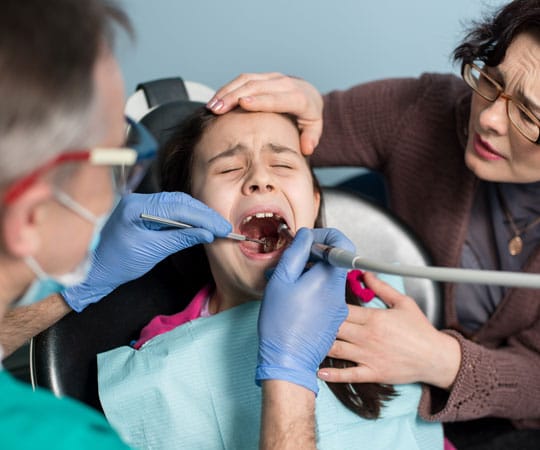What to Expect from Your Initial Visit to a Dentist in Eugene Oregon
What to Expect from Your Initial Visit to a Dentist in Eugene Oregon
Blog Article
An Overview to Typical Dental Conditions That Require a Dental professional's Treatment
Comprehending the variety of dental conditions that require specialist care is extremely important for keeping optimal dental health. Toothaches, for example, can be symptomatic of serious concerns such as tooth cavities, split teeth, or abscesses, each calling for details interventions like dental fillings or origin canals. Gum tissue disease, from the early phases of gingivitis to extra extreme periodontitis, emphasizes the significance of regular dental check-ups and cleanings. In addition, impacted knowledge teeth and jaw problems can present substantial discomfort and difficulties. Making sure timely brows through to the dental professional can alleviate these issues properly, however what exactly are the treatments and signs included?
Toothaches
Toothaches are a typical dental condition that can range from light pain to extreme pain, usually indicating a hidden issue that requires expert interest. This pain can stem from a range of resources, including dental tooth cavities, broken or fractured teeth, and dental abscesses. Each of these conditions poses substantial threats if left unattended, possibly resulting in more extreme difficulties.
Tooth decays, also referred to as caries, are brought on by the buildup of plaque that erodes tooth enamel, bring about holes or pits in the impacted teeth (dentist eugene oregon). Cracked or fractured teeth, on the other hand, may result from injury, grinding, or attacking right into tough items. These structural damages can expose the delicate internal layers of the tooth, causing acute pain and boosting the threat of infection. Abscesses hurt infections at the origin of a tooth or in between the gum tissue and a tooth, normally resulting from serious degeneration or without treatment tooth cavities.
Reliable treatment of toothaches entails attending to the source. This might consist of fillings for dental caries, crowns for split teeth, or root canals and prescription antibiotics for abscesses. Early treatment by an oral expert can protect against additional deterioration and minimize pain, making sure optimal dental health and wellness.
Gum Illness
Gum tissue condition, a common yet typically forgotten dental problem, materializes via inflammation and infection of the periodontals and supporting cells. This problem mainly happens in two phases: gingivitis and periodontitis. Gingivitis, the milder form, presents with signs and symptoms such as red, swollen periodontals that might hemorrhage conveniently during cleaning or flossing. If left untreated, gingivitis can advance to periodontitis, a more serious type defined by the destruction of the sustaining bone and connective tissue, ultimately causing tooth loss.
The key root cause of periodontal condition is bacterial plaque, a sticky, anemic movie that frequently creates on teeth. Poor dental hygiene, cigarette smoking, hereditary tendency, and particular clinical conditions, such as diabetic issues, can worsen the danger of establishing gum tissue condition. Normal dental check-ups are crucial for very early discovery and administration of this condition.
Treatment for gum condition varies from professional oral cleaning and scaling to more innovative procedures like root planing and periodontal surgical treatment, depending upon the extent. Keeping good dental health techniques, including cleaning twice daily, flossing, and making use of an antibacterial mouth wash, can significantly lower the threat of gum disease and promote much healthier gum tissues.
Tooth Cavities
Tooth cavities, likewise referred to as tooth decays, are a common oral problem characterized by the damage of tooth enamel due to acid-producing microorganisms in the mouth. These microorganisms thrive on sugars and starches from food and drinks, producing acids that slowly deteriorate the enamel, bring about tooth cavity development.
Early-stage cavities may disappoint signs and symptoms, however as they progress, they can trigger toothache, level of sensitivity to chilly or hot, visible openings or pits in the teeth, and discoloration. If left unattended, tooth cavities can permeate much deeper layers of the tooth, possibly causing extreme discomfort, infection, and even tooth loss.
Stopping tooth cavities involves a combination of good dental hygiene methods and nutritional habits. Normal brushing with fluoride toothpaste, flossing, and regular dental examinations are crucial. Dental experts may also suggest additional preventive steps, such as fluoride therapies and dental sealers, to protect teeth from decay.
Small dental caries can be addressed with dental fillings, which restore the tooth's framework. A lot more sophisticated situations might require crowns or also root canal treatment if the degeneration has reached his explanation the tooth's pulp.

Impacted Knowledge Teeth
Impacted wisdom teeth are a prevalent oral concern that occurs when the third molars, typically described as knowledge teeth, fall short to completely emerge or line up properly within the mouth. This problem usually results from inadequate room in the jaw or an unusual growth angle of the web teeth. Impacted wisdom teeth can lead to a selection of difficulties, including damages, pain, and infection to surrounding teeth.
When wisdom teeth end up being influenced, they are often partly erupted or continue to be completely underneath the gum line. This partial eruption can produce a path for bacteria to enter the periodontals, causing infections that show up as swelling, pain, and also high temperature. In addition, influenced knowledge teeth can exert stress on neighboring teeth, potentially causing crowding or shifting.
An extensive oral exam, commonly including X-rays, is vital for diagnosing affected wisdom teeth. Normal oral examinations are a good idea to monitor the problem and preserve oral health and wellness.
Jaw Disorders
Jaw problems, jointly referred to as temporomandibular joint (TMJ) problems, encompass a variety of problems that impact the jaw joint and bordering muscles. These problems can materialize with signs and symptoms such as pain or inflammation in the jaw, trouble eating, a clicking or popping noise when closing the mouth or opening up, and even chronic migraines. TMJ problems can occur from different variables, consisting of arthritis, jaw injury, or habitual habits like teeth grinding or jaw clenching.
Medical diagnosis of TMJ disorders usually involves an extensive examination by a dentist, including a physical assessment of the jaw, dental X-rays, and often advanced imaging strategies like MRI or CT scans to examine the joint's problem. Non-invasive approaches such as physical therapy, dental splints, and medications aimed at minimizing inflammation and pain are frequently first-line therapies.
Very early treatment by an oral professional is crucial to protect against the development of TMJ problems and to maintain overall oral health and wellness. Individuals experiencing consistent jaw pain or dysfunction must seek timely examination and treatment.
Conclusion
Toothaches frequently suggest blog here underlying issues such as cavities, cracked teeth, or abscesses, needing punctual treatment. Affected knowledge teeth and jaw problems also need specialist interest to reduce pain and prevent more difficulties.
Dental tooth cavities, likewise recognized as caries, are created by the build-up of plaque that deteriorates tooth enamel, leading to holes or pits in the influenced teeth. Abscesses are excruciating infections at the root of a tooth or in between a tooth and the gum tissue, generally resulting from severe degeneration or unattended cavities.

In addition, affected wisdom teeth can exert pressure on surrounding teeth, potentially causing crowding or changing.
Report this page